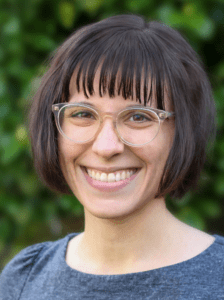Posted By: Kylee Spencer, PhD, Assistant Editor, AJHG
Each month, the editors of The American Journal of Human Genetics interview an author of a recently published paper. This month we check in with Renee (@reneegeck) to discuss her recent paper “Functional interpretation, cataloging, and analysis of 1,341 glucose-6-phosphate dehydrogenase variants”.

KS: What prompted you to start working on this project?
RG: I needed to find some G6PD variants with a range of activities for an experiment I was planning. As I was reading the literature, I was finding reviews and following the trails back to the original literature, and finding references to even more articles, and started keeping track of the information available on each variant. At some point it had grown so far beyond my initial validation set that I decided to go back with a systematic approach to make it into a more useful resource. I wanted to create a centralized database of variants so that others could access the same primary data without going through layers of references.
KS: What about this paper/project most excites you?
RG: I’m really excited about the potential for this to be a resource that others can use to further their projects or clinical implementations. I have met so many incredible scientists and clinicians who are interested in G6PD deficiency, and am excited to continue working with them to improve our ability to interpret variants.
KS: Thinking about the bigger picture, what implications do you see from this work for the larger human genetics community?
RG: I hope that it serves as an example of what we can do with the data we already have: there is so much information available on variants and their function, but if it’s not reported to databases by the authors it’s often hard to find until there is a curation effort. I hope to especially emphasize the utility of curating information on rare variants or ones with little information available, because by putting together many small pieces of information across studies we can better understand the function of rare variants.
KS: What advice do you have for trainees/young scientists?
RG: Find a mentor who supports your explorations. The unpredictable nature of research can be either frustrating or freeing, and having support to go after things that I didn’t anticipate, but looked really promising and interesting, led to some of my favorite research projects. Along with that, finding collaborators and working together over an extended period of time is key to increasing that support network and broadening your knowledge.
KS: And for fun, tell us something about your life outside of the lab.
RG: My love for research and curation doesn’t stop with G6PD – I’m also very interested in archival photography and the satisfaction of piecing together small mysteries from old photos and documents. I also take time away from books and computers, and love to go hiking or just walk around different neighborhoods and explore.
